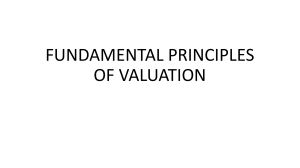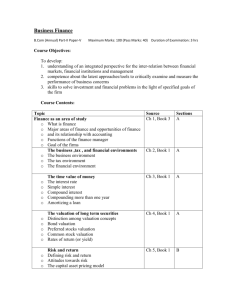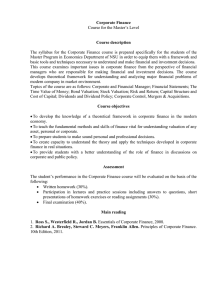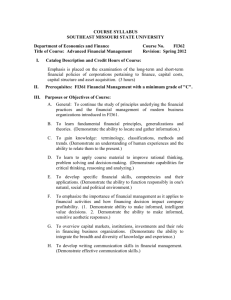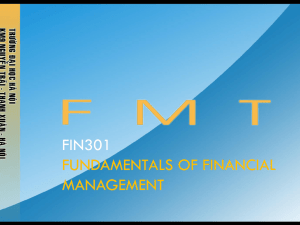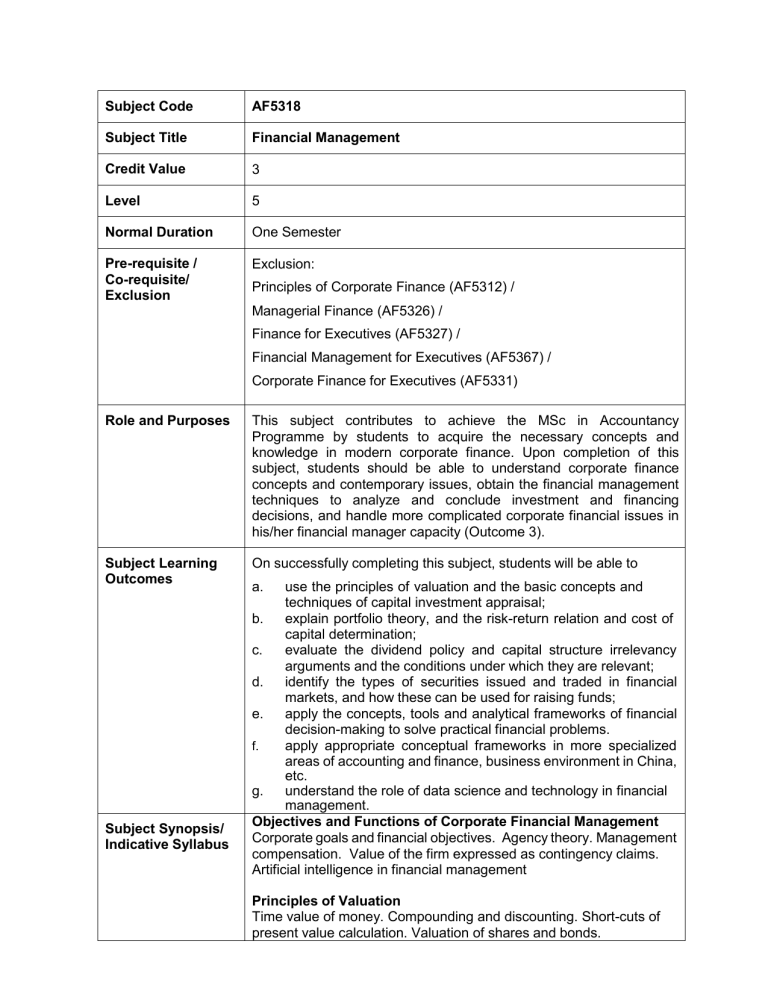
Subject Code AF5318 Subject Title Financial Management Credit Value 3 Level 5 Normal Duration One Semester Pre-requisite / Co-requisite/ Exclusion Exclusion: Principles of Corporate Finance (AF5312) / Managerial Finance (AF5326) / Finance for Executives (AF5327) / Financial Management for Executives (AF5367) / Corporate Finance for Executives (AF5331) Role and Purposes This subject contributes to achieve the MSc in Accountancy Programme by students to acquire the necessary concepts and knowledge in modern corporate finance. Upon completion of this subject, students should be able to understand corporate finance concepts and contemporary issues, obtain the financial management techniques to analyze and conclude investment and financing decisions, and handle more complicated corporate financial issues in his/her financial manager capacity (Outcome 3). Subject Learning Outcomes On successfully completing this subject, students will be able to Subject Synopsis/ Indicative Syllabus a. use the principles of valuation and the basic concepts and techniques of capital investment appraisal; b. explain portfolio theory, and the risk-return relation and cost of capital determination; c. evaluate the dividend policy and capital structure irrelevancy arguments and the conditions under which they are relevant; d. identify the types of securities issued and traded in financial markets, and how these can be used for raising funds; e. apply the concepts, tools and analytical frameworks of financial decision-making to solve practical financial problems. f. apply appropriate conceptual frameworks in more specialized areas of accounting and finance, business environment in China, etc. g. understand the role of data science and technology in financial management. Objectives and Functions of Corporate Financial Management Corporate goals and financial objectives. Agency theory. Management compensation. Value of the firm expressed as contingency claims. Artificial intelligence in financial management Principles of Valuation Time value of money. Compounding and discounting. Short-cuts of present value calculation. Valuation of shares and bonds. Capital Investment Appraisals Real interest versus nominal interest. Cash flow and discounted cash flow. Data analytics and capital budgeting techniques. Separating investment decision from financing decision. Replacement decisions. Risk analysis and realoption. Portfolio Theory and Capital Asset Pricing Model Concept and benefits of portfolio diversification. Crypto assets and diversification. Systematic and diversifiable risk. Efficient portfolios. Two-Fund Separation Theorem.CAPM. Determinants and estimation of beta. Efficient Market Hypothesis Competition as a driving force behind information efficiency. Weakform, semi-strong form and strong form Efficient Market Hypothesis. Empirical evidence. Long-term Financing Basic features of equity, debt financing and crowdfunding. Initial public offering: mechanism and pricing. Rights offering. Bond rating, call provisions and pricing. Types of securities issued and traded in financial markets. Capital Structure and Dividend Decisions Issues of controversy. MM propositions, implications and limitations. Pecking Order Theory. Information content of capital structure and dividend decisions. Valuation and Capital Budgeting for the Levered Firm NPV analysis for financing transactions, the APV approach, the Flow to Equity approach, the WACC approach. Teaching/Learning Methodology Assessment Methods in Alignment with Intended Learning The subject is structured around lectures/seminars, supplemented by exercises within class and group presentation. Guest speakers may be invited to give expert views on current topics. Students are urged to prepare themselves well for each class and to proactively interact with both the instructor and other students. They should read all relevant chapters a few times and make preparation for practice questions as well as participate in class discussion. Specific assessment methods/tasks % weightin g Intended subject learning outcomes to be assessed (Please tick as appropriate) Outcomes a Continuous Assessment : 50% b c d e f g Participation 10% √ √ √ √ √ √ √ Mid-term Test 20% √ √ √ √ √ √ √ Individual Written Report 12% √ √ √ √ √ √ √ Group Presentation 8% √ √ √ √ √ √ √ Final Examination: 50% √ √ √ √ √ √ √ Total 100 % To reflect the significant technology content in this subject, 10% (or more) of the overall weighting of this subject is based on individual assessment concerning technology-related knowledge in financial management. Note: The specific requirements on individual assessment components discussed above could be adjusted based on thepedagogical needs of subject lecturers. Student Study Effort Expected Class contact: Lectures & case studies 39 Hrs. Student study effort: Reading materials 45 Hrs. Midterm Test/ Individual Assignment 45 Hrs. Total student study effort Reading List andReferences 129 Hrs. Textbook Ross, Westerfield, Jaffe and Jordan, Corporate Finance, (12th Edition), McGraw-Hill. (ISBN10: 1259918947 ISBN13: 9781259918940) References Palepu, Healy, & Peek, Text and Cases Business Analysis and Valuation IFRS edition Second Edition South-Western CENGAGE Learning
